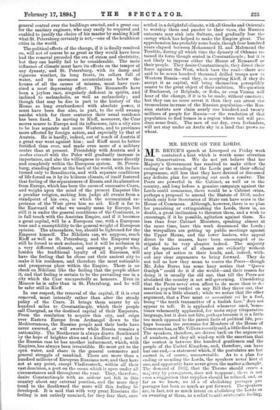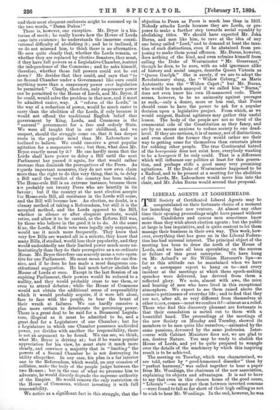MR. BRYCE ON THE LORDS.
MR. BRYCE'S speech at Liverpool on Friday week contained a hint which is worth some attention from Conservatives. We do not yet believe that her Majesty's Government has resolved to make either the ending or the mending of the Lords part of their official programme, still less that they have devised or discussed any definite plan for carrying out such a resolve. The peers are powerful in the Cabinet, as well as in the country, and long before a genuine campaign against the Lords could commence, there would be a Cabinet crisis, perhaps a proposal to amend the Statute of 1858, under which only four Secretaries of State can have seats in the House of Commons. Although, however, there is no plan for punishing or extinguishing the Lords, there is, no doubt, a great inclination to threaten them, and a wish to encourage, if it be possible, agitation against them. No less than four Cabinet Ministers, speaking almost at the same time, have this week denounced the Lords ; the wirepullers are getting up public meetings against the Upper House, and the lower leaders, who appeal direct to the masses, have been encouraged or in- stigated to be very abusive indeed. The majority of the speakers of all classes are evidently without any plan of action in their heads, and, indeed, with- out any clear arguments to bring forward. They do not tell us how they mean to coerce the Peers—though Mr. John Burns has some hazy notion that "Queen Guelph" could do it if she would—and their reason for doing it is usually the old one, that till the Peers are abolished the country is not self-governing. Considering that the Peers never even affect to do more than to &- mad a popular verdict on any Bill they throw out, that assertion is a little absurd; while we notice that the other argument, that a Peer must ex necessitate rei be a fool, being "the tenth transmitter of a foolish face," does not appear th tell. It is applauded whenever used, 'some- times vehemently applauded, for mobs enjoy vituperative language, but it does not bite, perhaps because it is a little too much opposed to the patent facts of political life, per- haps because the reverence for Members of the House of Commons has, as Mr. Villiers recently said, a little died away. The speakers, therefore, are driven back on the argument of numbers, and they all wind-up with the assertion that the contest is between five hundred gentlemen and the people of the United Kingdom, and, therefore, can have but one end,—a, statement which, if the postulates are but correct is, of course, unanswerable. As to a plan for ending or mending the Lords, the speakers never hint at one, and apparently have never given the matter a thought. The demand of 1832, that the Throne should create a nia;ority by prerogative, does not reappear ; there is not even a suggestion that supplies should be refused, and, as far as we know, no id_a, of abolishing peerages qua peerages has been so much as put forward. The speakers are, in fact, not so much intent on abolishing the Lords as on swearing at them, as a relief to anti-aristocratic feeling, and their most eloquent outbursts might be summed up in the two words, "Damn Dukes ! "
There is, however, one exception. Mr. Bryce is a his- torian of merit ; he really knows how the House of Lords came into existence ; he understands the immense consti- tutional difficulty of abolishing it ; and he is inclined, if we do not misread him, to think there is an alternative. He sees quite clearly that, whether the Lords remain, or whether they are replaced by elective Senators, they must, if they have full powers as a Legislative Chamber, restrict the independence of the Commons ; and he asks himself, therefore, whether those full powers could not be cut down ? He decides that they could, and says that "to no Second Chamber under a Government like ours could anything more than a suspensory power over legislation be permitted." Clearly, therefore, only suspensory power can be permitted to the House of Lords, and Mr. Bryce, if he could, would solve the problem in that new, and it must be admitted easier, way. A "reform of the Lords," in the way of a reduction of power, would be much easier to carry than the abolition of the Lords, if only because it would not offend the traditional English belief that government by King, Lords, and Commons is the " natural " government for a free and orderly State. We were all taught that in our childhood, and we suspect, should the struggle come on, that it has deeper roots in the popular mind than Mr. Labouchere is inclined to believe. We could conceive a great popular agitation for a suspensive veto ; but then, what does Mr. Bryce exactly mean by it ? He can hardly mean that the Lords shall have power to delay a Bill until the next Parliament has passed it again, for that would rather increase than diminish the prerogatives of the Peers. As ragards important measures, they do not now even claim more than the right to do this very thing, that is, to delay a Bill until the verdict of the country has been taken. The Home-rule Bill is an extreme instance, because there are probably not twenty Peers who are heartily in its favour ; but if the country at the next election accepts tie Home-rule Bill, all resistance in the Lords will cease, and the Bill will become law. An election, no doubt, is a clumsy method of taking a Referendum, but still it is the accepted method, and the Lords opposed to the Bill, whether in silence or after eloquent protests, would retire, and allow it to be carried, as the Reform Bill was, by those who believe in the good it is to do. At the same tine, the Lords, if their veto were legally only suspensive, would use it much more frequently. They know that very few Bills are wanted all in a minute, they know that many Bills, if studied, would lose their popularity, and they would undoubtedly use their limited power much more un- hesitatingly than they do their prerogative as a co-ordinate House. Mr. Bryce therefore can scarcely mean a veto opera- tive for one Parliament. He must mean a veto for one Ses- sion, and if he does he has made a most dangerous con- stitutional suggestion. He had much better abolish the House of Lords at once. Except in the last Session of an expiring Parliament, their powers would be reduced to a nullity, and they would probably cease to use them, or even to attend debates ; while the House of Commons would not obtain the additional sense of responsibility which it would probably acquire, if it were left alone, face to face with the people, to bear the brunt of their wrath at failures. We can hardly conceive a plan more certain to deteriorate the governing power. There is a great deal to be said for a Bicameral Legisla- ture, illogical as it must be admitted to be, and a great deal for a Legislature of one Chamber ; but for a Legislature in which one Chamber possesses undivided power, yet divides with another the responsibility, there is not an argument to be found. We can see, we think, what Mr. Bryce is driving at ; but if he wants popular appreciation for his view, he must state it much more clearly, and convince a majority that in " limiting " the powers of a Second Chamber he is not destroying its utility altogether. In any case, his plan is a far inferior one to the Referendum, which would, on any occasion of collision, make the body of the people judge between the two Houses ; but in the case of what we presume him to advocate, he would directly degrade the supreme authority of the Empire. He would remove the only restriction on the House of Commons, without investing it with full responsibility. We notice as a significant fact in this struggle, that the objection to Peers as Peers is much less than in 1831. Nobody attacks Lords because they are Lords, or pro- poses to make a further step towards social equality by abolishing titles. We should have expected Mr. John Burns, and men like him, to rave at the idea of any one being called "Lord," and to demand at least the taxa- tion of such distinctions, even if he abstained from pro- posing to make them penal offences. Mr. Burns, however, does nothing of the kind, and even refrains himself from calling the Duke of Westminster "Mr. Grosvenor," though he does, to be sure, with an odd ignorance alike of history and social usages, describe Queen Victoria as "Queen Guelph." She is surely, if we are to adopt the Revolutionary slang, the "Widow Coburg," as Marie Antoinette was the "Widow Capet ;" but Mr. Burns, who would be much annoyed if we called him "Burns," does not even know his own ill-mannered code. There seems, however, to be no animosity against peerages as such,—only a desire, more or less real, that Peers should cease to have the power to ask for a popular decision upon a legislative project. From which, as we would suggest, Radical agitators may gather this useful lesson. The body of the people are not so tired of the ornamental side of the Constitution as they fancy, and are by no means anxious to reduce society to one dead- level. If they are envious, it is of money, not of distinctions, and even about the former they would rather see their way to getting some for themselves than entertain plans for robbing other people. The true Continental hatred of the bourgeoisie does not exist here, everybody wanting to be a bourgeois if he only could. That is a difference which will influence our politics at least for this genera- tion, and perhaps stifle a good many very promising agitations. If the Duke of Westminster happened to be a Radical, and to be present at a meeting for the abolition of the Lords, Mr. Labouchere would move him into the chair, and Mr. John Burns would second that proposal.







































 Previous page
Previous page